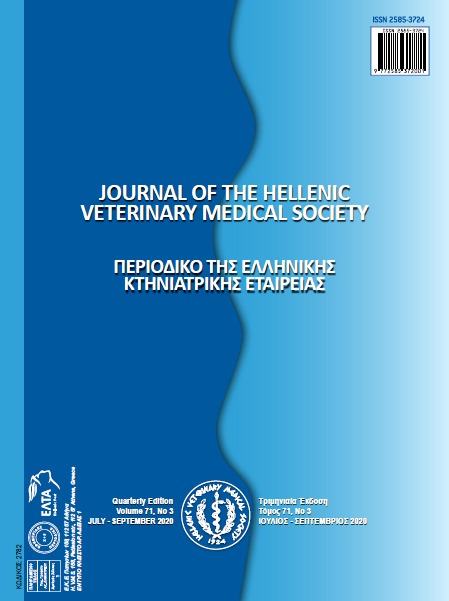A Review on Rabbit Hemorrhagic Disease with a Special Reference to Egyptian Situation
Abstract
Rabbit hemorrhagic disease (RHD) is considered as one of the most important viral diseases that affects and threatens rabbit’s flocks. This disease has affected rabbits since mid-1980. Two epidemics of RHD had been discovered; the first was in mid-1980 and known as classical RHD virus (RHDV), while the second was in 2011 and described as variant virus (RHDVb/RHDV2). Domestic and wild rabbits are susceptible to RHD. All ages can be affected, but adults are more susceptible to young kitten. RHD is presented in three forms; per-acute, acute and subacute or chronic form. Mortality rate is usually high especially in per-acute and acute stages and it is associated with disseminated intravascular coagulopathy and necrotic hepatitis. The main lesions have been observed in the liver, lungs and spleen. Diagnosis of RHD is based on the clinical picture and detection of RHDV or specific antibodies. The prevention and control strategies depend mainly on using of preventive inactivated vaccine together with adoptionof hygienic measures. However, there is no specific treatment of RHDV infection. So, this review article puts a spot light on RHD regarding the epidemiology, the clinical and laboratory diagnosis as well as the prevention and control strategies with a special reference to Egyptian situation.
Article Details
- How to Cite
-
ABD EL-GHANY, W. A. (2020). A Review on Rabbit Hemorrhagic Disease with a Special Reference to Egyptian Situation. Journal of the Hellenic Veterinary Medical Society, 71(3), 2243–2250. https://doi.org/10.12681/jhvms.25065
- Issue
- Vol. 71 No. 3 (2020)
- Section
- Review Articles

This work is licensed under a Creative Commons Attribution-NonCommercial 4.0 International License.
Authors who publish with this journal agree to the following terms:
· Authors retain copyright and grant the journal right of first publication with the work simultaneously licensed under a Creative Commons Attribution Non-Commercial License that allows others to share the work with an acknowledgement of the work's authorship and initial publication in this journal.
· Authors are able to enter into separate, additional contractual arrangements for the non-exclusive distribution of the journal's published version of the work (e.g. post it to an institutional repository or publish it in a book), with an acknowledgement of its initial publication in this journal.
· Authors are permitted and encouraged to post their work online (preferably in institutional repositories or on their website) prior to and during the submission process, as it can lead to productive exchanges, as well as earlier and greater citation of published work.



